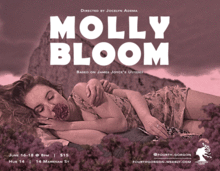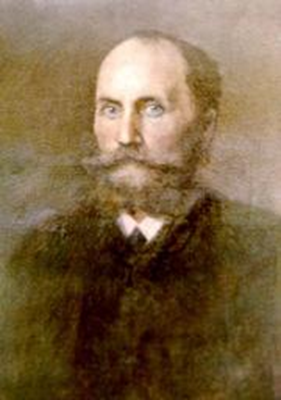Death as compression and decompression. James Joyce and Molly Bloom
A quick glance on James Joyce’s Ulysses, in particular its notorious
last chapter which consists of Molly Bloom’s endless, unpunctuated soliloquy,
shows that uncontrolled self-reflection repeatedly reminisces death; remarkably
often in connection with lovemaking[1]. Not
only does Molly Bloom frequently refer to the death of others; for example her
youngest son who died as a baby, a tragedy jointly remembered with a lovemaking
scene – a scene which ‘embraces’ the burial mention:
 “we came together when I was watching the
two dogs up in her behind in the middle of the naked street that disheartened
me altogether I suppose I oughtnt to have buried him in that little woolly
jacket I knitted crying as I was but give it to some poor child but I knew well
Id never have another our 1st death too it was we were never the same
since O Im not going to think myself into the glooms about that any more I
wonder why he wouldnt stay the night”. (my italics, RS)
“we came together when I was watching the
two dogs up in her behind in the middle of the naked street that disheartened
me altogether I suppose I oughtnt to have buried him in that little woolly
jacket I knitted crying as I was but give it to some poor child but I knew well
Id never have another our 1st death too it was we were never the same
since O Im not going to think myself into the glooms about that any more I
wonder why he wouldnt stay the night”. (my italics, RS)
Molly also mentions her own prospective death, remarkably again in
connection to lovemaking:
“Ill have to hunt around again for someone
every day I get up theres some new thing on sweet God sweet God well when Im stretched
out dead in my grave I suppose Ill have some peace I want to get up a
minute if Im let wait O Jesus wait yes that thing has come on me yes now
wouldnt that afflict you of course all the poking and rooting and ploughing he
had up in me”. (my italics, RS)
Earlier,
she had already memorised her uniqueness and irreplaceability – which are
underlined in the preference of dying 20 times over sacrificing this uniqueness
once more by marrying (as if dying at least recognises and acknowledges the
self, whereas marriage merely spoils it).
“now what could you make of a man like that Id
rather die 20 times over than marry another of their sex of course hed
never find another woman like me to put up with him the way I do know me
come sleep with me yes” (my italics, RS);
As I suggested in the second chapter, discussing ecstasy, the orgasmic
experience can be considered as a compression of self, as opposed to
inspiration which is a decompression of self. It could be argued that
death, as enhanced subliminality, paradoxically combines these apparently
mutually exclusive happenings.
On the one hand, death underlines an experienced
irreplaceability and unique selfhood – as opposed to marriage which destroys it
(this is expressed by the “know me come sleep with me” followed by “all the
poking and rooting and ploughing he had up in me” indicating the vanity of his
attempt to ‘know’). On the other hand, death decompresses the self and
reaches out to God and peace: “sweet God sweet God well when Im stretched out
dead in my grave I suppose Ill have some peace”.
Whereas the connection of death to compression of selfhood seems
all too obvious – death underlines someone’s uniqueness by terminating their availability
and approachability –, things seem to be different for its connection to decompression
of selfhood. The self-abandonment and decompression characteristic not only of
ecstasy and inspiration but also of death may be concealed by the grave.
Yet,
this concealment does not imply the absence of self-abandoning decompression. “Jedes animalische Wesen und vor allem der Mensch hat ein Interesse
daran,” we have seen in Klages, “gewisse Seelenvorgänge nicht zu zeigen.” (Ludwig Klages, Grundlagen der Charakterkunde, p. 122) The confrontation with the two openly mating dogs
(“the two dogs up
in her behind in the middle of the naked street”), however, “disheartens” Molly; not only does
it elicit a simultaneous orgasm with her partner (“we came together”), she also realises that her creative efforts
(“that little
woolly jacket I knitted”)
‘suit’ death, or her dead baby, well (“but I knew well Id never have another our 1st
death too it was”).
In sum, death
may combine compression and decompression of selfhood. It may reconcile what in
the orgasmic experience, on the one hand, and in ecstatic inspiration, on the
other, is still distinct. The enhancement of subliminality consists of the
unbelievable, unimaginable experience in which the self, as a self,
expands beyond limits.
[1] “Miss Stack bringing him
flowers the worst old ones she could find at the bottom of the basket anything
at all to get into a mans bedroom with her old maids voice trying to imagine he
was dying on account of her to never see thy face again”, Joyce (1992, 1922). Ulysses.
London: Penguin Books, p. 872; “if he was married Im sure hed have
a fine strong child but I dont know Poldy has more spunk in him yes thatd be
awfully jolly I suppose it was meeting Josie Powell and the funeral and
thinking about me and Boylan set him off” (877f); “love is sighing I am dying” (899);
“I was dying to find out was he circumcised he was shaking like a jelly all
over they want to do everything too quick take all the pleasure out of it” (899).




Reacties
Een reactie posten